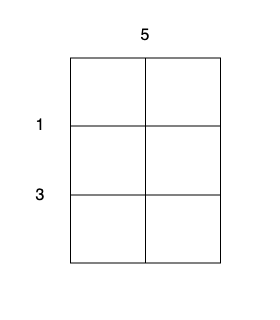LeetCode in Kotlin
3219. Minimum Cost for Cutting Cake II
Hard
There is an m x n cake that needs to be cut into 1 x 1 pieces.
You are given integers m, n, and two arrays:
horizontalCutof sizem - 1, wherehorizontalCut[i]represents the cost to cut along the horizontal linei.verticalCutof sizen - 1, whereverticalCut[j]represents the cost to cut along the vertical linej.
In one operation, you can choose any piece of cake that is not yet a 1 x 1 square and perform one of the following cuts:
- Cut along a horizontal line
iat a cost ofhorizontalCut[i]. - Cut along a vertical line
jat a cost ofverticalCut[j].
After the cut, the piece of cake is divided into two distinct pieces.
The cost of a cut depends only on the initial cost of the line and does not change.
Return the minimum total cost to cut the entire cake into 1 x 1 pieces.
Example 1:
Input: m = 3, n = 2, horizontalCut = [1,3], verticalCut = [5]
Output: 13
Explanation:

- Perform a cut on the vertical line 0 with cost 5, current total cost is 5.
- Perform a cut on the horizontal line 0 on
3 x 1subgrid with cost 1. - Perform a cut on the horizontal line 0 on
3 x 1subgrid with cost 1. - Perform a cut on the horizontal line 1 on
2 x 1subgrid with cost 3. - Perform a cut on the horizontal line 1 on
2 x 1subgrid with cost 3.
The total cost is 5 + 1 + 1 + 3 + 3 = 13.
Example 2:
Input: m = 2, n = 2, horizontalCut = [7], verticalCut = [4]
Output: 15
Explanation:
- Perform a cut on the horizontal line 0 with cost 7.
- Perform a cut on the vertical line 0 on
1 x 2subgrid with cost 4. - Perform a cut on the vertical line 0 on
1 x 2subgrid with cost 4.
The total cost is 7 + 4 + 4 = 15.
Constraints:
1 <= m, n <= 105horizontalCut.length == m - 1verticalCut.length == n - 11 <= horizontalCut[i], verticalCut[i] <= 103
Solution
class Solution {
fun minimumCost(m: Int, n: Int, horizontalCut: IntArray, verticalCut: IntArray): Long {
val horizontalCounts = IntArray(N)
val verticalCounts = IntArray(N)
var max = 0
for (x in horizontalCut) {
if (x > max) {
max = x
}
horizontalCounts[x]++
}
for (x in verticalCut) {
if (x > max) {
max = x
}
verticalCounts[x]++
}
var ans: Long = 0
var horizontalCount = 1
var verticalCount = 1
for (x in max downTo 1) {
ans += horizontalCounts[x].toLong() * x * horizontalCount
verticalCount += horizontalCounts[x]
horizontalCounts[x] = 0
ans += verticalCounts[x].toLong() * x * verticalCount
horizontalCount += verticalCounts[x]
verticalCounts[x] = 0
}
return ans
}
companion object {
private const val N = 1001
}
}

